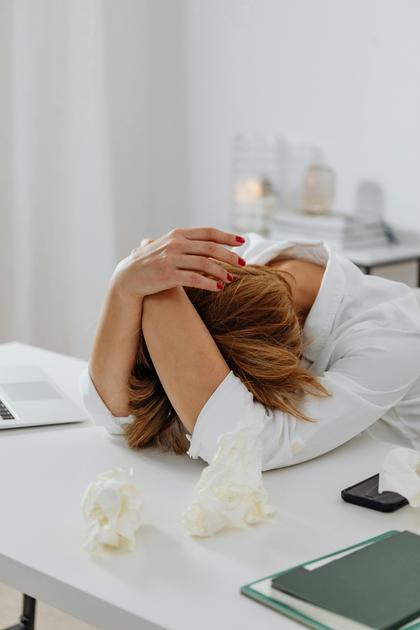As women over 30, we often juggle countless responsibilities, but stress in women frequently goes unnoticed. Are you experiencing unexplained fatigue, insomnia, or anxiety? These silent symptoms may be telling you something important about your health. In this article, we’ll explore these quiet signs, giving you the insight you need to prioritize your well-being and find the peace you deserve.
It’s essential to listen to your body and recognize that you’re not alone. Many women face similar struggles, but what if there’s a way to manage these challenges without heavy medication? See here how many women are resolving this without heavy meds and reclaiming their lives.
The Calm Reset — 7 Days to Feel Steady, Kind & In Control Again - Only $2.99
Gentle guidance trusted by our community.
Understanding the Silent Symptoms of Stress
Stress in women can often go unnoticed, simmering beneath the surface. It’s essential to recognize the silent symptoms that can impact well-being. Many women experience subtle signs that can interfere with daily life. These may include persistent fatigue, problems with sleep, or even heightened feelings of anxiety without a clear trigger. Listening to our bodies is crucial. If you find yourself feeling mentally or physically drained, it might be time to check in with yourself.
The Impact of Stress on Women’s Health
Women often juggle multiple roles, from being caregivers to professionals. This balancing act can lead to chronic stress, impacting overall health. Stress can contribute to hormonal imbalances, making women more susceptible to conditions like PCOS or thyroid issues. Not to mention stronger symptoms of PMDD. Understanding the connection between chronic stress and health is vital for women over 30.
Common Misconceptions About Stress
There are many myths surrounding stress. One common misconception is that stress only manifests through obvious signs like irritability or depression. However, stress can also present in less visible forms such as digestive issues, headaches, or even a weakened immune system. By acknowledging these less apparent symptoms, women can take proactive steps toward their health.
Recognizing the Signs of Stress You Might Miss
Stress can manifest in various ways. Sometimes, we may overlook signs, mistaking them for just a bad day or fatigue. Here are some subtle signs of stress to keep an eye on:
- Changes in Appetite: Are you eating too much or too little?
- Withdrawal from Social Activities: Do you find yourself avoiding friends or family?
- Decreased Motivation: Are you struggling to find joy in things you once loved?
- Increased Irritability: Is your patience wearing thin?
Emotional and Physical Symptoms to Watch For
It’s easy to overlook emotional symptoms. However, they can serve as a clear indicator that something isn’t right. Signs such as anxiety, irritability, or constant feeling overwhelmed can signal chronic stress. Additionally, physical symptoms like muscle tension, headaches, and digestive problems may arise. Listening to these physical cues is essential.
How Stress Affects Hormonal Balance
Stress plays a significant role in hormonal health. When the body is under stress, it produces more cortisol. Elevated cortisol can lead to irregular menstrual cycles and impact fertility. Hormonal imbalances often magnify the stress women feel. Recognizing this link can empower women to seek change in their lives.
Practical Tips for Managing Everyday Stress
Managing stress doesn’t need to be complicated. Here are some practical tips to ease the burden of daily stress:
- Practice Mindfulness: Take a few minutes each day to breathe deeply and focus on the present.
- Regular Exercise: Physical activity can help release built-up tension.
- Quality Sleep: Prioritize good sleep hygiene to recharge your body.
- Limit Caffeine: Too much caffeine can heighten feelings of anxiety.
Additionally, consider finding new hobbies or reconnecting with nature, which can significantly enhance your mood.
If you’re curious about how other women are navigating similar challenges without heavy medications, see here how many women are resolving this.
The Importance of Self-Care
Women often prioritize others’ needs over their own, which can lead to neglecting self-care. Prioritizing yourself is not selfish; it’s essential for maintaining overall well-being. Start small. Dedicate a few minutes each day to do something that brings you joy, whether that’s reading, crafting, or simply enjoying a warm cup of tea. Recognizing the importance of self-care can shift your focus back to health.
Creating a Support Network for Recovery
Having a support system is crucial. Connecting with friends, family, or even support groups can provide a safe space to express how you feel. Support can also come in the form of professional help. Do not hesitate to seek a therapist or counselor who can help navigate stress and its effects on your life. Remember, you don’t have to go through this alone.
Encouragement for Your Journey Towards Healing
Healing is a journey, not a destination. You may face hurdles but remember, each step forward is progress. It’s possible to improve your situation and unwind some of the stress that weighs you down. Many women have found simple yet effective solutions to manage stress and restore balance in their lives. You can, too! Take a moment for yourself and explore what works.
Remember, you are not alone on this journey. With the right support, encouragement, and tools, you can find your way back to a place of well-being.
The Calm Reset — 7 Days to Feel Steady, Kind & In Control Again - Only $2.99
Gentle guidance trusted by our community.







